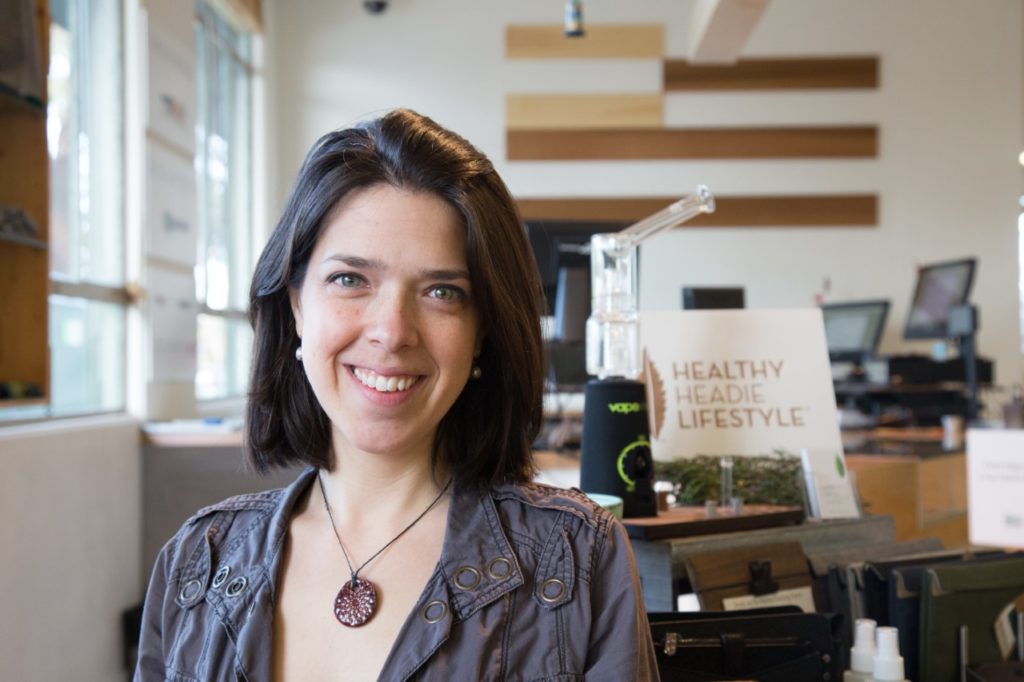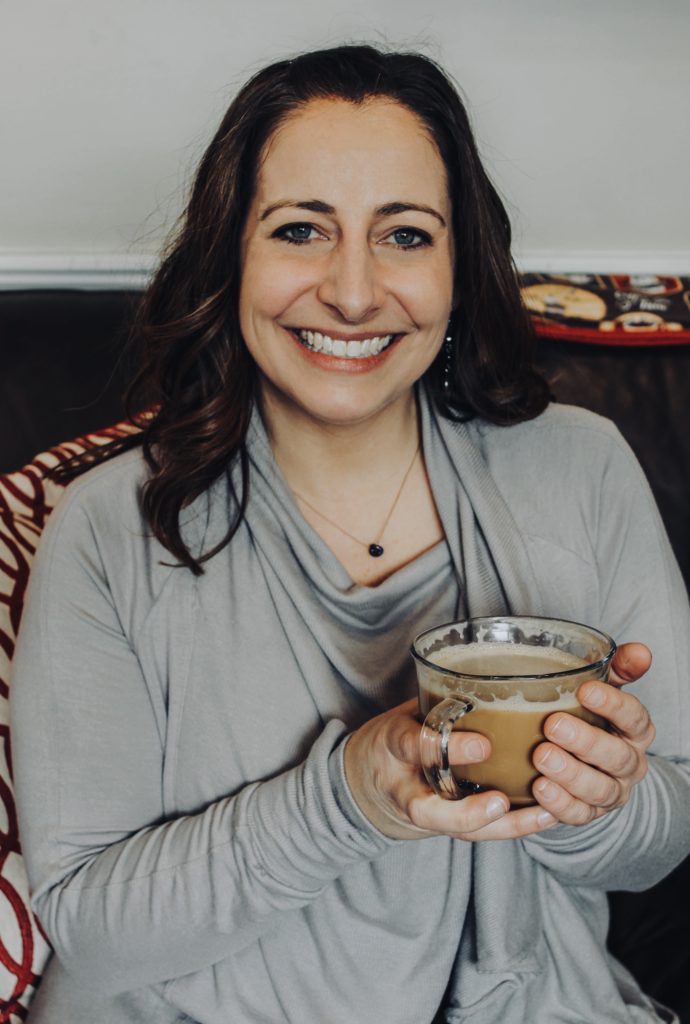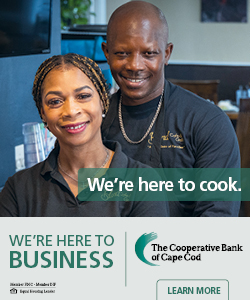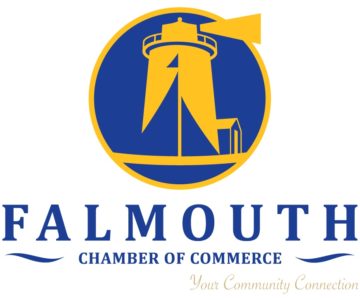Editor’s Note: This month, as we highlight the 2020 Class of 40 Under 40, we take a look back at three previous honorees, who share their insights about their work and lives.
Holly Alberti-Evans: Leader, Expert In The Cannabis Industry
Holly Alberti-Evans was a driven leader from day one. At Plymouth South High School, she participated in the Marketing Program, worked at the school store and spent her time competing (and winning) awards in the school’s DECA program. The DECA program prepares emerging leaders and entrepreneurs in marketing, finance, hospitality and management in high schools and colleges around the globe.

I was part of a work co-op and began working at Gap Inc., leaving half of the day to go fold clothes and learn about retail – all the while getting paid. It was great,” says the 37-year-Plymouth resident.
She attended Curry College, graduating in 2005 with a business degree and a minor in communications. While in school, she worked several jobs and was always helping people with their businesses, as a sort of freelance consultant.
“On top of this, I began an internship at Reebok International, working my way up to gain a full-time position in the organization. I guess you can say, I’ve always had a very business-focused mentality and it was a driving force throughout my early education.”
Alberti-Evans is now a recognized leader and expert in the cannabis industry, owner of her consulting brand and is focused on business development and helping businesses and brands of all sizes break into the budding industry.
“In 2011, I began expanding my consulting business and working with cannabis clients. Referred to as the ‘Wild West,’ I focused on California, traveling to where the medical program had passed well before any other states, back in 1996. In 2013, I launched my own ancillary cannabis business, later relocating to Colorado in 2015 to expand it further. I spent almost a year on the fund-raising circuit, alongside many of today’s up-and-coming cannabusinesses CEOs and founders.”
In 2016, she continued further West, landing in Oakland, Calif., where she worked with industry pioneers and continued to grow her knowledge and businesses. But she would soon find herself heading back home to New England.
“After losing my mother in August 2018, I relocated back east to be closer to family. I was asked to join a large multi-state operator, iAnthus, in Boston, to grow the Mayflower Medicinals brand – which I did up until May of this year.”
Her mother was a great inspiration to her.
“When I was young, she had her own interior design company. I would help her on jobs, carrying the tool box and step ladder, unwrapping plastic and removing elastics from window blinds before she would install them, and carefully steaming the beautiful fabrics of the custom, handmade window treatments. She was a crafty woman who always told me to follow my dreams.”
It seems like just yesterday, she recalled, where she was working with Reebok, setting up at Allen Iverson’s house for his 30th birthday or hanging with 50 Cent and G-Unit in Vegas for a movie premiere.
“My experiences have been fantastic, for the most part. Sure, working in heartless corporations can be tough, and launching a startup or running your own business can be grueling, but I wouldn’t change any of it. Learning, growing, absorbing, adapting and adjusting is necessary and it’s all about the journey, right?”
Unfortunately for many, the worldwide pandemic this year has affected small and growing businesses in ways business owners could not fathom. Some will survive it, while others may not. Many will feel the effects for quite some time.
“I am blown away by what I have seen unfold over these last few months,” Alberti-Evans says. “I think that it is greatly affecting all generations. At the start of the ‘safer at home’ warnings, my generation in particular seemed to be reminiscing and embracing the nostalgia of it all – playing with puzzles, slowing down with their families and themselves, eating Twinkies and mac and cheese.”
She says the pandemic, in all reality, is transformative. “COVID-19 has caused our country and its economy to be faced with unprecedented challenges. I don’t believe we will see the true ramifications of this epidemic for a few years.” Businesses, as well as consumers, will need to adapt, she says.
“For my business, I am now offering services for all industries, not just cannabis, but eCommerce and online stores, business development, social media, and merchant processing – assessing digital presence and working through solutions that fit the needs and goals of the organization. Several clients quickly made pivots, adjusting manufacturing or obtaining items that were in need. Retail clients went digital, utilizing pre-ordering and curbside pickup options, and delivery.”
Bigger than the pandemic, she said, is the Black Lives Matter movement sweeping the U.S. and the entire world.
“I’ve witnessed and heard stories from too many; I’ve seen the disparities. Silence is not the answer; discussions and action are necessary,” says Alberti-Evans. “I am grateful to be a young, healthy white woman, born and raised in Massachusetts. However, I do not accept the business-as-usual rhetoric. I do not accept the continued injustice. We can and will vote with our dollars. It is more important now to ensure that businesses practice what they preach. When you make a purchase from a business, choose to support those businesses making a difference.”
Alberti-Evans has always wanted to be her own boss and now she is. She looks forward to working with more like-minded businesses over the next five years to change the narrative for black businesses and smaller businesses.
“The current economic conditions, unemployment at a high and many communities not fully re-open, create some of the biggest challenges yet,” she says. “We will all need to do our part. In 10 years, I hope to become an expert at many of my hobbies. I look forward to mentoring more, and bringing together more fruitful relationships, continuing to make a better tomorrow. My goal has always been to influence others positively. Cannabis is a common connector, breaking down differences. Its uses are endless – fuel, fiber, food, and I do hope that ‘Hemp Can Save the World,’ as Jack Herer said.”
Those hobbies include yoga, hiking, going to the beach, reading, writing.
“I love adventures and spending time with family,” she adds. “Prior to all of this, traveling, trying new restaurants and [listening to] live music was always something I’ve enjoyed. Spending time in different areas, experiencing new places with my husband has always been something we make time for. Since February, however, like many others, I have been deepening my roots and exploring locally. There are some amazing places to visit in Massachusetts and New England and I am grateful to find the silver lining in all of this.”
Susana Murphy: Taking the Real Estate Industry By Storm
A Greenwich University, London graduate, with a double major in International Business and German, Susana Murphy, 46, always dreamt of running a business and loved anything to do with marketing. You could say her career really began when her school gave her a work visa to work in the marketing department at Fidelity investments in Boston.
“Growing up in Spain, I was obsessed with the movie ‘Working Girl’ with Melanie Griffin and Harrison Ford,” she reflects. “Truly, I identified with her character, and I would dream of one day working hard like she did and climbing up the ladder, and I would dream of America. I knew the soundtrack by heart. Funny how the universe has your back, huh? Here I am, living in the best country in the world now, owning my own business.”

Other than retail jobs she had through school and internships, Murphy has always worked for herself. The first business she owned was a marketing firm in St. Louis that did direct mail campaigns for restaurants, hotels and golf courses, which she owned with her husband, called American Advertising.
“Once we started a family, we wanted to return to New England where he was from to be closer to family and I landed a job as a headhunter in Boston. That career ended after September 11, since my company folded within a few months. There was no hiring happening at that time. I had just built a home in America’s Hometown – Plymouth. I had a nanny from Germany who left to go back home just as soon as they opened the airports. I didn’t know what I was going to do next but I knew I wanted to run my own show and not work for someone else.”
Murphy’s neighbor owned a small real estate company and suggested she get her real estate license, noting that it was practically what she had been doing as a headhunter, but with houses and families.
“I decided to enter real estate when most agents were exiting right after a terrorist attack and about to enter one of the worst housing crises this country will ever see,” she says. “Somehow, within my first few months, I was selling more than most and got hooked. I loved having the creativity to think outside of the box on how to market and sell a home, and loved the independence that real estate provided.”
Murphy had a very successful career working for a big franchise firm, always a top 1 percent producer. She used her innovation, forward-thinking attitude and work ethic to manage to sell homes, “when people were literally burying St. Joseph’s figurines in their backyards and praying to sell,” she says. In 2013, she made the decision to open her own boutique real estate firm, called ALANTE Real Estate.
“I was frustrated with the bar being so low in my industry,” she says. “People pay a hefty amount of money to brokerages for their services and for that money they should get the best of everything – best signs, best brochures, best media campaign, best marketing campaign, best exposure, etc. It drives me nuts that, in 2020, you still see agents taking photos with their phones or not knowing how to properly pre-market a home to generate a long list of qualified buyers for your client. I wanted to raise the bar with the marketing, the technology, the systems and, most importantly, the level of service provided.
“The second reason why I wanted to open this brokerage was for the struggling agents who also had the ‘Working Girl’ dream,” adds Murphy. “You see, in my industry less than 5 percent of Realtors make all the sales and money. The rest are struggling agents and that should not be that way. With proper systems, training and support behind you, every agent should be a six-figure earner and have the opportunity to assist 20 to 30-plus families annually with no problem. I always say, heck, if I am not even from this country, didn’t go to school here, don’t have family here and have never NOT made six figures since my first year in real estate … if I can do this, you can too! I am passionate to help others realize those goals and dreams now.”
Murphy runs a tight ship in Plymouth, one that has assisted more than 600 families since it opened its doors.
“All the reviews online point to people loving our marketing, systems and the level of service we provide,” she says. “We are grateful to have had the opportunity to make a dent in the South Shore. Cape Cod is next for us, and we know there are a lot of Realtors who would benefit and see their careers skyrocket with us, and we are excited at the idea of helping our peers.”
COVID-19 has impacted the real estate industry in a positive way, she saya, by forcing Realtors to polish their technological skills in order to market the homes and put contracts together virtually. It has allowed Realtors to have the time to get more education, training and have better systems in place.
“As far as the temporary slowdown we felt in the month of March for obvious reasons, that low curve is now back up and the demand for housing is high, in fact we are seeing a lot of city folks rethinking urban living in small places and calling us to move to the suburbs. We are having one of the busiest summers we have seen in years, it’s a very busy and hot sellers’ market.”
While Murphy has adapted to the American lifestyle, she said there is still a lot of Spanish culture in her.
“Back in Spain we take siestas in the middle of the day. It’s not just in the movies; we all go home to eat lunch as a family,, including the children, they close businesses and schools so from one to four people are home together, eating together. We vacation for one month in the summer as a family.
“So, while in the USA, all of that would be most likely unheard of, I still very much have what I call ‘non-negotiables’ in life and tell my agents to have them too. Non-negotiables are the things that are most important in life – time with family and loved ones or time for yourself – the things that bring you the most joy. People used to tell me I was crazy, that I would lose so much business going away to Europe in the summer. It’s my non-negotiable.
“That’s what life is all about,” Murphy says. “Work hard, but play harder and enjoy every minute of it. Life is too short if you don’t make time for some siestas, so whatever siestas mean to you, do it.”
Amanda Roy: From Restaurant Owner to Consultant, Persistence Pays Off
Plymouth resident Amanda Roy’s first job out of college was as an account executive for WB Mason. It wasn’t an easy job and it brought with it a long, bumpy road – and a few life lessons about persistence.

“It was a grinding sales job, boots to the ground, sales 101, door-to-door cold calling in all kinds of weather, daily sales numbers posted for all of your co-workers to see… it motivated me,” she recalls. “My first terrible sales call stayed with me; it changed me. It was an attorney’s office in Milford and the secretary was just miserable. I consider myself a people person and usually connect with people right away, but not this time. She told me to never come back, that I was rude for thinking she would want my sales flyer as she was waving her finger in my face. Yikes! I went to my car and cried. My first real rejection; the real world just showed up!”
Roy avoided that office for weeks until she had in possession a $.01 sale flyer. “Who doesn’t love office supplies for a penny?” she says. “I was going back to face the lady, who probably didn’t even know how badly she hurt my feelings. She picked up the phone that wasn’t ringing as soon as she saw me, pretending to be on an important phone call. I just placed the flyer on the counter and, as I walked away, she tossed it in the trash. Two weeks later I did it again … trash.
“Two weeks after that there was a new, friendly secretary at the desk. I walked in and introduced myself. She was thrilled to see the penny flyer that I had. She signed up as a customer and I left with an order. I would not want to go back to a sales job like this but I learned so much from that job. A bad attitude never gets you anywhere and, if I didn’t get up the courage to go back in there, I never would have seen that there was a new opportunity waiting for me.”
From WB Mason, Roy moved on into the world of mortgage lending, where she worked as a retail loan officer for three and a half years, and as a wholesale rep for four years. When the market was crashing in 2008, she was working for Citi Home Equity, and her entire division closed. From there, she became the East Coast sales rep for a paint company in Portland, Ore., called Yolo Colorhouse.
“The company story was great,” she says. “The two founders were interior designers and artists who were sick of feeling sick after painting. Low- and no-VOC paints were not common at this time. They came up with a paint that was low-VOC and non-toxic and had it manufactured.” The owners believed in living sustainably, and leaving a small carbon footprint. They hired passionate people, and they created a vibe, a culture.
Roy knew she wanted to work for them as soon as they started chatting on their conference call. She could hear their passion about their company and product. The company hit the ground running, and the low-VOC paint market was hot.
“I love, love, loved this job,” Roy says. “They left a lasting impression on how to run a business for sure – they were that business!”
After Yolo downsized, Roy found herself on the job hunt once more. She was also getting divorced and selling her house, so life was a bit hectic.
“On one of my trips to my hometown of Monson, one of my friends called me to see if I could help a friend at her coffeehouse in Sturbridge because one of her employees had just walked out mid-shift. I had worked at a coffee shop for two months in college, and I remembered nothing from those days, but yes, of course I would help.”
One day of helping turned into two, then three, and so on. The job was fun, social and relaxing. It was just the mental break Roy needed – until opportunity came knocking.
“I was given the opportunity to open a small cafe of my own in the lobby of the Plymouth Registry of Motor Vehicles. I agreed to it on a whim and that’s how the Jolly Bean began,” she says. “It was the water cooler for all of the tenants of the building. Everyone got to know each other, and it was so great to see people from different businesses greeting each other by name as they would see each other.
“Not long after, a local restaurant owner was retiring and the building’s owner was renting out the space. I met the building owner, I committed to renting it that day, after almost four and a half years, I was moving into my own brick-and-mortar space. I was approved for a loan from the Plymouth Economic Development Committee. Construction began immediately – it was gutted and rebuilt.”
She ignored the naysayers who told her that her location was a “fail location” and that it was too far off the beaten path. She was also told her menu would never work because that is not what was served there before. But Roy saw this as a unique opportunity – one she just couldn’t pass up.
“There was plenty of parking for buses, tractor trailers, heavy equipment or a golf cart. The business was a success, thank God,” she says. “I loved the social part of the daily interactions, the networking groups, the community outreach opportunities and most of all that it became the water cooler of the park.”
What she didn’t expect was that employing and managing people is not easy, and she learned quickly that she did not want to manage people for the rest of her life.
“I learned some quick, hurtful lessons,” says Roy, now 41. “I felt like that girl crying in my car after that bad sales call, but years later. I told my accountant five months in to set the business up to be sold. If owning this [business] was going to take this much out of me, then I needed an exit plan. If it got better, then score all the way around. But I did not want to continue owning it if this is what it was going to be like. It was changing my faith in humanity.”
Roy’s business was sold in August 2019. “I would say that nine and a half years is a great run for something that I started on a whim during a hectic time in my life. I’m proud of myself for continuing to put my key in that door every day; that was really hard to do some days. I can envision business owners reading that last sentence and knowing the exact feeling I am talking about.”
In September, she began her new adventure in consulting and coaching, through her new company, Amanda Roy Consulting.
“I have loved working with owners who want to be coached, taught, given the tools to succeed and then enforce them. Sometimes you just need someone who understands what you are going through to help find a solution to help lighten the load.”
Being a small business owner has challenged Roy in many ways. “When I owned the restaurant I had no work-life balance. It was all work. Every time I planned something to do in my own life, something would happen at work and I would end up working. I lived with the daily anxiety of waiting for the other shoe to drop. Since selling, I have been all about life, and making up for some lost times.”























